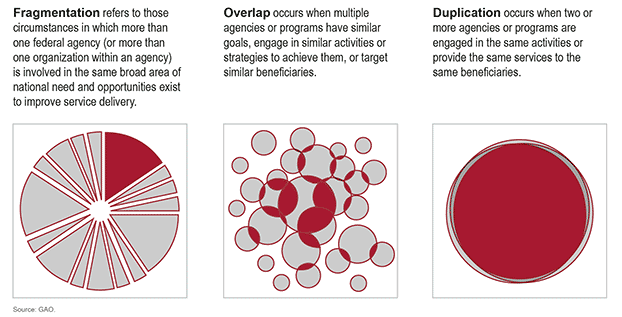2013 Annual Report: Actions Needed to Reduce Fragmentation, Overlap, and Duplication and Achieve Other Financial Benefits
GAO-13-279SP
Published: Apr 09, 2013. Publicly Released: Apr 09, 2013.
Skip to Highlights
Recommendations
Matter for Congressional Consideration
| Matter | Status | Comments |
|---|---|---|
| Congress may wish to consider authorizing agencies enhanced flexibility to acquire certain satellite services related to hosted payload and ride sharing arrangements, when appropriately planned and justified. | Congress passed legislation that authorizes enhanced flexibility to acquire satellite services related to hosted payload and ride share arrangements, as GAO suggested in April 2013. In December 2013, Congress passed the National Defense Authorization Act for Fiscal Year 2014, which required the Department of Defense (DOD) to conduct a study that (1) reviewed existing and past operationally responsive low-cost launch efforts by domestic or foreign governments or industry and (2) assessed the viability of greater utilization of innovative methods, including the use of secondary payload adapters on existing launch vehicles. DOD conducted its study and issued a report in June 2015, which GAO reviewed. The study identified specific needs that could be addressed by the development of operationally responsive space capabilities, which may help DOD to gain enhanced flexibility to review and identify additional options for acquiring satellite services related to hosted payloads and ride sharing arrangements. The enactment of this legislation and the conclusion of the DOD study should help DOD gain additional flexibility to identify options for hosted payloads and ride sharing. Having this additional flexibility could promote cost savings and help reduce government satellite program costs. | |
| Congress may wish to consider revisiting the law to determine whether efforts should be made to provide federal agencies additional flexibility to select space transportation services and launch vehicles from other countries for hosted payloads to encourage cost savings. | On November 21, 2013, the Executive Office of the President issued a revised U.S. Space Transportation Policy that includes additional flexibility for federal agencies to select space transportation services and launch vehicles from other countries for hosted payloads. Although Congress has not taken action to introduce legislation, as GAO suggested in April 2013, the recently issued policy provides agencies with additional flexibility for selecting these services and vehicles from other countries, which could promote cost savings. Accordingly, GAO considers this action addressed. | |
| Congress may wish to consider directing the Transportation Security Administration (TSA) to study, in consultation with relevant industry stakeholders, whether the 90 percent federal cost share that TSA generally applies to cost sharing agreements for eligible airport facility modification projects, related to the installation of checked baggage screening systems, is appropriate or should be adjusted. | As of February 2018, no legislative action had been identified. Since GAO made its suggestion in April 2013, there has been less demand for airport improvement projects to install checked baggage screening systems because many projects across TSA-regulated airports have been completed or remain in progress under existing cost sharing agreements. Furthermore, since fiscal year 2012, Congress has authorized TSA to use a funding source to procure and install checked baggage screening equipment that had previously been dedicated solely to support the facility modification projects necessary to install checked baggage screening systems. For these reasons, in conjunction with an absence of Congressional action to address the cost share since GAO first made its suggestion, GAO has closed this action as not addressed and will no longer track implementation. | |
| Congress may wish to consider whether an amendment to current legislation, or enactment of new legislation, is necessary and warranted if it is determined that a change in the current federal cost share that the Transportation Security Administration (TSA) generally applies to these cost sharing agreements is appropriate. | As of February 2018, no legislative action had been identified. Since GAO made its suggestion in April 2013, there has been less demand for airport improvement projects to install checked baggage screening systems because many projects across TSA-regulated airports have been completed or remain in progress under existing cost sharing agreements. Furthermore, since fiscal year 2012, Congress has authorized TSA to use a funding source to procure and install checked baggage screening equipment that had previously been dedicated solely to support the facility modification projects necessary to install checked baggage screening systems. For these reasons, in conjunction with an absence of Congressional action to address the cost share since GAO first made its suggestion, GAO has closed this action as not addressed and will no longer track implementation. |
Recommendations for Executive Action
| Agency Affected | Recommendation | Status |
|---|---|---|
| Executive Office of the President | The Executive Office of the President may wish to consider revisiting the policy to determine whether efforts should be made to provide federal agencies additional flexibility to select space transportation services and launch vehicles from other countries for hosted payloads to encourage cost savings. |
On November 21, 2013, the Executive Office of the President issued a revised U.S. Space Transportation Policy that includes additional flexibility for federal agencies to select space transportation services and launch vehicles from other countries for hosted payloads, as GAO suggested in April 2013. Having additional flexibility to select these services for hosted payloads could promote cost savings.
|
Full Report
GAO Contacts
Orice Williams Brown
Managing Director, Office of Congressional Relations
Congressional Relations
Public Inquiries
Topics
UniformsBudget functional classificationsHealthMedicareHousingSocial servicesInternational affairsAdministration of justiceVeterans benefitsNatural resources

